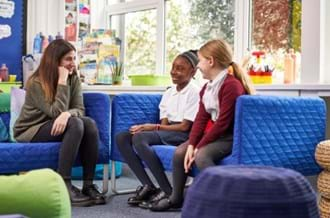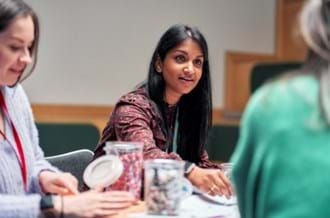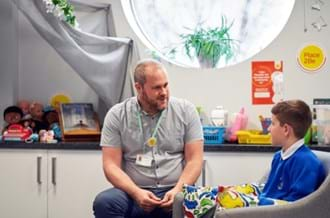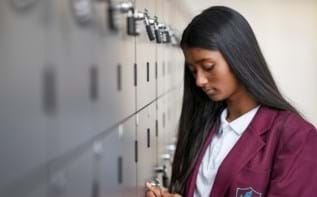Being a Counsellor on Placement with Place2Be
Being a Counsellor on Placement with Place2Be

Richard Kettley
Richard has a background as secondary school and university teacher in English and Drama. He later completed a Masters degree in counselling and psychotherapy, and then a post-graduate qualification in counselling children and young people, when he became a school counsellor. He is currently a staff trainer with Place2Be and regularly leads introductory workshops for Counsellors on Placement.
Having previously worked as a child counsellor, Richard Kettley is now one of Place2Be’s staff trainers. We sat down with him to learn more about what it’s like being a Counsellor on Placement with Place2Be and the opportunities available to counsellors once they complete their placement.
Could you start by explaining a little bit about your role at Place2Be?
I train Counsellors on Placement, which involves preparing them for being a Counsellor on Placement and helping them understand what to expect.
I also work as staff trainer, where I help school-based staff to think about mental health and wellbeing in schools, including those who are:
- teachers
- senior leaders
- headteachers
- teaching assistants
- additional support needs or Special Educational Needs and Disabilities (SEND) teachers.
What’s a typical day in the life of a school counsellor?
You would arrive at school, check in with your Place2Be School Project Manager, then head to the counselling room (or wherever you’re based) to make sure you’ve got all your materials ready for the day. You’d look through your notes for each child to see where you got up to last time and if any new concern has been raised.
Then the sessions (usually 45 minutes to an hour) would start, between which you’d take a moment’s reflection to make notes or raise any safeguarding issues. Qualified counsellors would see three or four children a day, but trainees usually start with one and gradually increase to two or three.
At the end of each day, you have supervision with your School Project Manager, which is an invaluable tool for self-reflection and learning.
What makes Place2Be unique as a training provider?
If you know you want to work with children and young people, the whole of Place2Be as an organisation is geared around the mental health and wellbeing of children and young people. Place2Be is very visible in schools; children already know what it means to go to a Place2Think session or a one-to-one session. Schools dedicate a room to Place2Be and so the environment is totally set up. It’s a very child-centered environment, from each child having their own box to keep artwork in, to what’s on the walls.
What opportunities for progression are there within Place2Be?
There’s a lot of opportunity for progression at Place2Be. Once you complete your placement, you can start applying for paid work, which could be supply work and just helping out, or you could apply to be a School Project Manager or Mental Health Practitioner.
In terms of getting a supervision role, you would probably need at least two years' post-qualification experience in a role, such as a counsellor. Throughout all of this, Place2Be provides continuous professional development (CPD), where you may choose to specialise in a specific topic, such as trauma or eating disorders.
What support does Place2Be give its Counsellors on Placement?
There’s the very user-friendly online learning hub, where you learn in chunks of 10 or 15 minutes at a time. It’s the sort of thing you can do on your placement day in between sessions. You’ll also receive supervision at the end of every placement day from your School Project Manager. It’s a reflective space, which may be up to an hour, where you can reflect on what’s happened in the day, and your supervisor will share their knowledge and skills as well.
How does counselling children differ from counselling adults?
With children it can be very immediate and very experiential, it’s nice to have that creative element. I think having conversations whilst you play means it’s much more in the open and more up front. I think adults have built up a lot of defences, so counselling can take quite a long time. The great thing about working with children is whilst there is stuff going on in their lives, you have the opportunity to make a difference and hopefully avert some of the worst effects carrying on over into adulthood.
What do you love about child counselling?
It’s a privilege to work alongside children and build those kinds of one-to-one relationships. A lot of children maybe don’t have a lot of one-to-one time with anyone, so it’s amazing to spend 45 minutes or an hour with a child for a number of weeks.
With training child counsellors specifically, I love seeing people come along at the start of the introductory workshops looking quite taken back by the art materials and toys everywhere, but by the end they’re really getting stuck in and playing with all this stuff. So, I suppose, seeing people reconnect with their own childhood, and how that opens doors for them to think, “that’s what it’s like to do that” and “that’s what it might be like to work with a child”.
News & blogs

Uniting health and schools to improve mental health
Read Place2Be Chief Executive, Catherine Roche's, thoughts on uniting health and schools to improve mental health.
Read more
Hayley and Jaynie's experiences on Place2Be’s Level 5 Certificate course
Read Hayley and Jaynie's experiences on our Level 5 course and their engagement with our unique therapeutic approach.
Read more
Russell's experience on Place2Be's Level 4 Diploma
Read Russell's experience on our Level 4 Diploma and his desire to encourage more men to consider counselling as a career.
Read more



